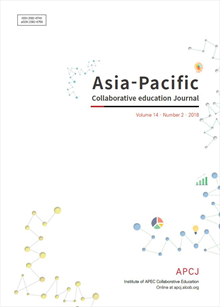간행물
Asia-Pacific Collaborative education Journal

- 발행기관 APEC국제교육협력원
- 자료유형 학술지
- 간기 반년간
- ISSN 2092-674X (Print)2092-6758 (Online)
- 수록기간 2004 ~ 2021
- 주제분류 사회과학 > 교육학 사회과학 분류의 다른 간행물
- 십진분류KDC 371DDC 379
권호리스트/논문검색
Volume 16 Number 1 (2020년 6월) 3건
1.
2020.06
구독 인증기관 무료, 개인회원 유료
HPT research studies and practices have been largely conducted in the corporate setting, leaving education as a neglected context despite its strong emphasis on performance in teaching, learning, and school management. In this study, we examine the application of the HPT standards and their effects on Korean teachers’ performance goal achievement for students. With HPT standards, we also investigate the interaction effect of teacher tenure on the relationship among HPT standards and goal achievement. The Hayes Process Model is adopted to examine the second-stage moderated mediation model. The findings support that the principle standards positively mediate the effect of the process standards on the teachers’ goal achievement, and teacher tenure moderates the HPT standards’ effects on goal achievement. The practical and theoretical implications of the results are discussed, as well as limitations and future research suggestions
4,800원
2.
2020.06
구독 인증기관 무료, 개인회원 유료
This paper reports a survey done that examined the relationship between the use of Facebook, WhatsApp, Twitter and Youtube on students’ academic performance in Osun State secondary schools. The study adopted the descriptive research design. The population of the study comprised all 7,767 teachers in Osun State secondary schools. The sample of 385 teachers was randomly selected. Two self-designed questionnaires were used. The data were analysed using Pearson Product Movement Correlation Statistics (PPMCS) at 0.05 level of significant. The findings showed that the use of Facebook (r = 0.692, df = 2071 & p<0.05), WhatsApp (r = 0.615, df = 2071 & p<0.05), Twitter (r = 0.542, df = 2071 & p<0.05), and Youtube (r = 0.461, df = 2071 & p<0.05) were significantly related to students’ academic performance of Osun State secondary schools. The study concluded that that the use of Facebook, WhatsApp, Twitter and Youtube among teachers and students had positive contributions to students’ academic performance of Osun State secondary schools. The findings implicate that the teachers and students in Osun State secondary schools and Nigeria at large should admire the use of social medial such as Facebook WhatsApp, Twitter and Youtube as an interactive forum for teaching-learning activities.
4,000원
3.
2020.06
구독 인증기관 무료, 개인회원 유료
Juan Contreras-Castillo, Pedro C. Santana-Mancilla, Norma Barón-Ramírez, Elba Abigail Morales Vanegas
The changes of the Fourth Industrial Revolution (Industry 4.0) are inevitable in all areas of daily life, from government to healthcare and commerce, including the educational field. Education 4.0 brings potential challenges to schools around the globe, such as digital technology, personalized data, and a connected world. Thus, this paper presents a Mexican case study about a classroom enhanced with digital technology to study the challenges that both students and teachers face to acquire and transmit the skills and competencies that Industry 4.0 requires. As a preliminary result, we found that the probability of students accepting this technology for learning is very high.
4,000원

